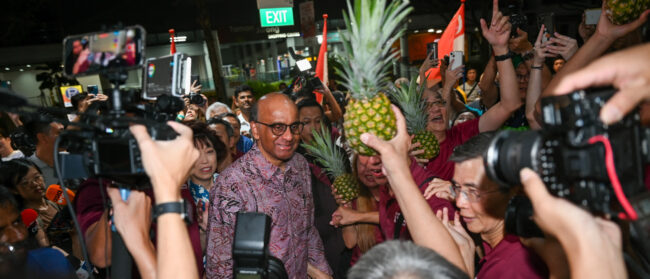Yohanes Sulaiman is an Indonesian politics and security analyst and a lecturer at the Universitas Jenderal Achmad Yani near Bandung in West Java. Links provided are in both English and Indonesian. The views in this piece do not necessarily reflect those of Southeast Asia Globe.
While it is still too early to say whether Indonesia will emerge unscathed from the Covid-19 Pandemic, future historians will perhaps look at Indonesia as a case study on how politics, personal rivalries, and social media, dominated by partisan buzzers cause havoc in Indonesian health crisis management.
Since January 2020, there were worries whether Indonesia was ready should an outbreak of Covid-19 happen. But what worried President Joko “Jokowi” Widodo administration more was whether the outbreak would damage Indonesia’s economy, especially its tourism industry; due to the pandemic, the number of Chinese tourists visiting Bali had dropped from 113,646 in January to only 4,820 in February.
On February 26, 2020, while many countries issued travel warnings, Indonesia instead launched initiatives to bolster tourism, including the widely derided “Rp. 72 billion funds to pay for influencers”. Later, as it faced much criticism, the government revealed the money would also be used to promote Indonesia’s tourist destinations.
The seeming lack of urgency from the Jokowi administration in tackling the rising threat of Covid-19 is due to three factors.
First, there’s Jokowi’s laser-like focus on the economy at the expense of everything else, such as eradicating corruption and promoting human rights. In this case, rather than thinking of how to tackle the pandemic, the Jokowi administration instead focused on how to minimise the potential damage from Covid-19 to Indonesia’s fragile economy. In essence, Indonesia was hoping to project the image of calmness and remaining open for business in order to keep the economy humming, despite the threat from the virus.

A meme lampooning Jokowi’s administration’s policy of attracting tourists, popular among anti-Jokowi social media accounts. Photo: Supplied
Thus, the Indonesian government reacted with fury when a Harvard academic in mid-February published research suggesting the Indonesian government was possibly underreporting the number of coronavirus cases. Indonesian Minister of Health Terawan Agus Putranto, who just announced a week before there were no coronavirus cases in Indonesia, called the report insulting.
Terawan, while declaring that Indonesia was following World Health Organization’s guidelines to prevent the outbreak of coronavirus, also claimed Indonesia was spared from the virus thanks to prayer.
In Jokowi’s defense, the World Health Organization by late February still advised against travel bans, seen as ineffective to prevent the spread of the virus. More importantly, the Jokowi administration is painfully aware of the high economic cost of lock down, not to mention the fact the poor would be the ones suffering most. Jokowi has pointed to chaos in India and Italy to suggest it is a result of their own lockdowns.
Macroeconomics aside, the second factor shaping the government’s response is the composition of Jokowi’s own cabinet, which does not include health care professionals and is instead business-oriented, filled with politicians, entrepreneurs and former military personnel. Minister of Health Terawan Agus Putranto himself was a retired general with the dubious distinction of being sanctioned by the Indonesian Doctors Association (IDI), with the IDI even asking Jokowi not to appoint Terawan as health minister. This lack of credible health professionals and public health experts in the government thus caused Indonesia to essentially fly blind in the face of the pandemic.
The spread of Covid-19 in Indonesia was thus politicised at the expense of effective response to the rapid spread of the virus, with the Jokowi administration trying to downplay the severity of the virus in order to calm the population and to prevent economic meltdown
The third factor to consider is the fact the issue of the Covid-19 pandemic is heavily politicised in Indonesia, as opposition politicians and ambitious individuals are seen as having seized the issue to score political points against the government. For instance, Anies Baswedan, the governor of Jakarta, on February 25 published an instruction to increase vigilance against coronavirus, followed by an announcement on March 1 that there were 132 people with suspected Covid-19 and 32 under surveillance.
While this move was applauded since it signalled that Anies was taking the Covid-19 threat seriously, Jokowi’s supporters saw it as an attempt to divert attention from his ineptitude in handling massive recent flooding in Jakarta while sabotaging Jokowi’s attempts to calm down the situation, thus wrecking the economy.
Furthermore, many believe Anies of harboring ambitions to run for president in 2024, and with his hopes in jeopardy due to his inability to tackle the Jakarta flooding, he decided to use the pandemic to revive his fortunes.
Not surprisingly, on March 2, 2020 ,the day after Anies’s announcement, Jokowi finally announced there were two people who were suspected of having Covid-19.
Analysts saw this as a reaction to what the President and his confidants believed was a sign that Anies, and the opposition as a whole, was politicising the virus. This belief the opposition was using the virus to dent the President’s credibility was further strengthened when a reporter from TVOne, a television channel seen as squarely on the opposition camp, ran coverage of the virus wearing full face respirator, implying the virus was far more dangerous than the government claimed.

The spread of Covid-19 in Indonesia was thus politicised at the expense of an effective response to the rapid spread of the virus, with the Jokowi administration trying to downplay the severity of the virus in order to calm the population and prevent economic meltdown.
At the same time, they saw Anies Baswedan’s efforts to tackle the virus as a way to boost his chance for reelection in 2022 and running for president in 2024 by undermining the public’s trust towards Jokowi. Not surprisingly, the Jokowi administration and its supporters didn’t look at this kindly and sought to undermine Anies Baswedan.
Thus, when Anies Baswedan declared he wanted to impose lockdown on Jakarta, Jokowi flatly refused and instead rebuked him, basically stating that Baswedan had overstepped his authority as only the central government is allowed to impose lockdown. Jokowi further justified his opposition against lockdown by mentioning the supposed chaos in India and Italy referenced above. On social media, supporters and opponents of Jokowi were thus divided into pro-lockdown and anti-lockdown crowds, a break that prevented any meaningful discussion.
Not surprisingly, later when Jokowi finally realised the Covid-19 situation had deteriorated, he remained unwilling to use the word “lockdown”, perhaps as it would have implicitly conceded Anies was right. Instead, Jokowi suggested he could invoke civil martial law should the situation become untenable.
As the number of people infected by Covid-19 increased in Indonesia, the lack of effective response by the central government forced local governments to take their own initiative in dealing with viral outbreak. Various towns and regencies across Indonesia have already imposed their own version of lockdowns.
To summarise, the central government’s response to the Covid-19 is sluggish due to the politicisation of the outbreak both by the ruling government and the opposition, not to mention the fact the administration is simply unprepared for this public health emergency. Indonesia’s success at weathering its share of the novel coronavirus pandemic depends on how well the subject and possible solutions can be depoliticised and whether Jokowi can craft a comprehensive and effective response towards the outbreak.


